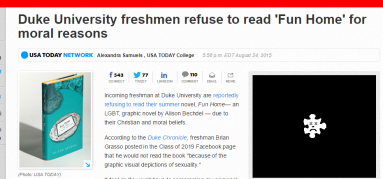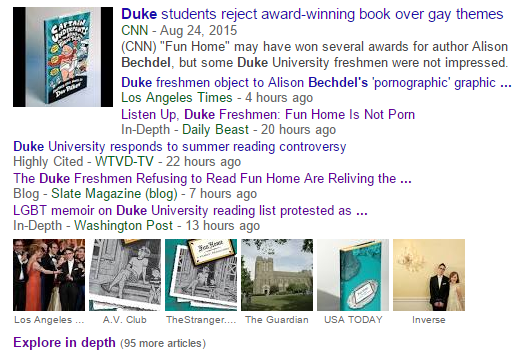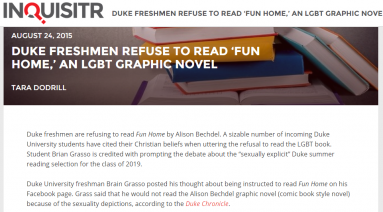On Friday, the Duke Chronicle—the student paper—ran a story whose headline declared “Freshmen skipping ‘Fun Home’ for moral reasons.”:
“Several incoming freshmen decided not to read “Fun Home” because its sexual images and themes conflicted with their personal and religious beliefs.” Freshman Brian Grasso posted in the Class of 2019 Facebook page July 26 that he would not read the book “because of the graphic visual depictions of sexuality,” igniting conversation among students.”
Since then, the story has been picked up by: CNN, USA Today, Salon, The New Civil Rights Movement, the Washington Post, the Onion AV club, Inquisitr, Slate, the Daily Beast, and a variety of other newsy-journalistic-ish outlets. But as far as one can tell, Claire Ballantine for the Duke Chronicle is the only journalist who has actually seen Freshman Brian Grasso’s inflammatory words. And this is as it should be. The “Class of 2019” Facebook page is a closed group—and I presume only Duke students have access to it—so it’s not surprising that the Duke student paper is the only media outlet that has actually reported on what actual people there are actually saying. Since the Duke student paper reports on things that are of general interest to Duke students, this otherwise fairly bland story isn’t out of place. “A student said something on Facebook and then some other students said some other things in response” is a run-of-the-mill “Talk About Town.” For context, this particular student journalist has recently written such local interest campus stories as “Renovated Rubenstein Library ready for students,” “University revises sexual assault policy for clarity,” “Freshmen reflect on O-week” and “Duke librarian doubles as scrabble whiz.”
For Duke students, in other words, this is a story in the same way that “Freshmen reflect on O-week” is a story: it’s a thing to read in the free newspaper you pick up as you walk to class, or to peruse in the morning if the student paper is your home page. It’s local interest, not “news.”
This is a point worth underscoring: unless you are a Duke student, this is not a conversation for you; a conversation on a closed Facebook group is a conversation by and for Duke university students. Why and how, then, has this become a story for anyone else? How has the story of a conversation that happened on a closed campus Facebook group, a month ago, managed to become a nationally reported story, today?
In most of the specifics, the story being reported (or recycled) by national media is almost exactly the same as the story reported by Claire Ballentine for the Duke paper. I don’t want to call it plagiarism, exactly—since they do credit her—but re-packaging and re-reporting another publication’s story is the lowest form of journalism. Even if they do link and attribute, they know that most people don’t follow the links, or care. It’s the sort of lazy hack-work that freshmen writing students must be taught not to do, in fact. If you simply re-package what someone else has said, you haven’t done any interesting work.
The national media has not reported precisely the same story as the campus media, however; as viruses must, this story has had to evolve in order to spread to new populations. And since none of the media that have picked up the story have any new reporting to add—other than getting a few reaction quotes here and there and/or adding some moralistic commentary—they tend to re-frame what the student paper wrote in a more sensationalist vein. It becomes less of a Duke story, and more of a "College Students" story (more than a few mild inaccuracies are introduced, too, as the writers come to be farther and farther from the original context). But these subtle changes and shifts in emphasis are exactly what make it a national story: without changing it, a local interest non-story would not be worth reporting in the national media, and it wouldn’t be.
Take, for example, the Washington Times, whose headline describes how “Duke Freshmen boycott ‘Fun Home’ Summer Reading.” If this isn’t exactly false, it’s not exactly true, and it’s certainly misleading. Duke has around 1,800 incoming freshmen; the fact that one of them posted on Facebook objecting to this book (and a handful of students commented favorably) tells us less than nothing about “Duke Freshmen.” It’s a terrifically bad sample population, anec-data at best, noise at worst. But calling a few Facebook comments a “boycott” goes a step farther, giving the clear but inaccurate impression that this is an organized protest. In the same vein, when the story at Inside Higher Education describes how “a number of students have taken their concerns public,” what does that word “public” mean? Does this simply mean that a Facebook thread happened? Maybe, but the phrase “taken their concerns public,” implies, again, something larger and more organized; does one usually call posting on a closed Facebook group "going public" with one's concerns?
If the Washington Times headline is the worst, nearly every headline gives the definite impression that a strong plurality or a very vocal minority of the freshman class are taking a stand of some kind. For example:
- Duke students refuse to read Alison Bechdel’s Fun Home, will probably fail the test, The AV Club
- Duke students reject award-winning book over gay themes edition, CNN
- Duke University freshmen refuse to read 'Fun Home' for moral reasons, USA Today
- College Students Refuse To Read Award-Winning Novel Because It Violates Their Christian Beliefs, the New Civil Rights Movement
- Duke freshmen refuse to read Fun Home, citing Christian beliefs, The Week
- Incoming Duke Freshmen Refuse to Read Alison Bechdel's Fun Home Because Lesbians Are Gross, The Stranger (Dan Savage)
- Duke Freshmen Refuse To Read 'Fun Home,' An LGBT Graphic Novel, The Inquisitr
- Incoming Duke Freshmen Refuse To Read Fun Home On Religious Grounds, Refinery29
- “Duke freshmen boycott 'Fun Home' summer reading due to 'Christian moral beliefs'” Washington Times
- “Some at Duke refuse the summer reading, a graphic novel about sexual identity,” Washington Post
Let me suggest some equally accurate headlines:
- “One Freshman Says On Facebook That He Won’t Read A Particular Book”
- “99.9% of Incoming Duke Have Not Declared Any Opinion About Whether They Will Read This Book.”
- “Most Expect that the Majority of the Incoming Freshmen Won’t Read the Book, But For No Particular Reason, Just That They Didn’t feel Like It, And It Wasn’t Required Reading Anyway.”
These headlines didn’t happen because they would not have grabbed clicks and eyeballs. Only by making a bad copy of a copy—only by subtly shifting crucial details just enough so that a non-story comes to seem like a story—can this non-event come to seem worth reporting by CNN, etc. Only by exaggerating what happens can it become the occasion for moralistic indignation. At Duke it was worth reporting; anywhere else, not so much. Which is why, again, every national news media that has reported the story has had to change it, in order to make it into a story; it’s not a story if they don’t report it inaccurately. “Duke Students Have Conversation on Facebook” is not a story. So it has become one, by becoming something different.
We understand why this happens. It’s the collective hunger of the online, for-profit media for tasty content that creates a situation where we find apparently reputable news outlets copying a student’s work, and doing it so badly—and so strategically badly—that a story is created where none would otherwise exist. The collective news consciousness is vaguely aware that college students are Anti-Speech Social Justice Warriors Who Also Generally the Worst, because we keep seeing op-eds declaring that it’s a real problem. It’s an easy story, especially when there’s a Man-Bites-Dog twist, such as the students in question being Christians. For hungry journalists who’d rather not do their homework, a whole set of confirmation biases and moralisms swings into action the moment they sniff anything of the sort. But just as plagiarism is a symptom of student apathy, shoddy content production is a symptom of journalistic apathy, but distributed: one outlet’s carelessness get replicated by the others and it adds up to a compelling (but misleading) narrative.
Take, for example, the fact that the USA Today story links to and relies on a story published by The Inquisitr.
 Now, the USA Today is not the most reputable news outlet you’ll ever find, but it’s the newspaper you get stuck with in hotels and it’s been around for long enough that one generally assumes it’s not completely worthless. The Inquisitr—which is where USA Today’s first link goes to—is pretty worthless.
Now, the USA Today is not the most reputable news outlet you’ll ever find, but it’s the newspaper you get stuck with in hotels and it’s been around for long enough that one generally assumes it’s not completely worthless. The Inquisitr—which is where USA Today’s first link goes to—is pretty worthless.
The Desk has a nice run-down on what The Inquisitr is and does, but the short version is that it’s an aggregation content mill that produces misinformation for clicks. But note how precisely similar the two stories are, how the USA Today has literally outsourced the reporting to the Inquisitr—reporting that it has been reported and linking to that reporting—but the first paragraphs are very similar:
The Inquisitr: Duke freshmen are refusing to read Fun Home by Alison Bechdel. A sizable number of incoming Duke University students have cited their Christian beliefs when uttering the refusal to read the LGBT book.
USA Today: Incoming freshmen at Duke University are reportedly refusing to read their summer novel, Fun Home— an LGBT, graphic novel by Alison Bechdel — due to their Christian and moral beliefs.
Both of them eventually link to the Duke Chronicle, but after the Inquisitr excises the qualifying phrases “For some members of the Class of 2019” and “Several incoming freshmen” from Claire Ballentine’s original piece, USA Today inherits this omission, continuing to report that “Incoming Freshmen,” in the plural, are “refusing.” But the original Duke Chronicle piece doesn’t use the word “refuse” because that’s the wrong word to use in that context, the wrong word to describe not reading a suggested summer reading selection. On campus, there is nothing remarkable about not reading a non-recommended book; lots of schools have these programs, and lots of students ignore couldn’t care less. My dear alma mater, for example, the University of California, Berkeley, has suggested that new students read Freedom’s Orator, the new biography of Mario Savio. A fine choice! And a huge percentage of the incoming class won’t even bother to pick up the free copy the University buys for them. I would be very surprised if this weren’t equally true at Duke, where a great many students who don’t read Fun Home will choose not to read it because they don’t feel like reading a book, or because they read a different book, or books, or for no reason at all. They won’t have read it, because they aren’t required to read it.
People say things on Facebook, and sometimes the things they say represent deep beliefs… and sometimes people are just typing words because they have nothing better to do. But when a whole bunch of people start Having VERY Strong Opinions About The Kids These Days, based on a handful of facebook comments—possibly the universe’s least significant speech-acts—it tells you that they are not really reacting to a thing that happened; they are enjoying the occasion to make a performative spectacle of their disgust. Social media is filled with people being appalled at these students right now, but none of them are appalled at “Brian Grasso and the several other people who apparently agreed with him last month”; they are upset at Students. What upsets them is the spectacle of Students Protesting, and that spectacle is so appalling they don’t even have to see it to be appalled.
No one is all that interested in Brian Grasso. Instead, we are seeing what Sara Ahmed describes, in “Against Students,” as a very common knee-jerk rhetorical position, a performance for which “students” are necessary, “a series of speech acts which consistently position students, or at least specific kinds of students, as a threat to education, to free speech, to civilization, even to life itself":
“In speaking against students, these speech acts also speak for more or less explicitly articulated sets of values: freedom, reason, education, democracy. Students are failing to reproduce the required norms of conduct…Students are not transmitting the right message, or are evidence that we have failed to transmit the right message. Students have become an error message, a beep, beep, that is announcing system failure.”
In practice, those "students" usually turn out to be a caricature. But in the absence of Brian Grasso's words--since the hue and cry has proceeded gleefully with only a few quoted fragments of his words--it has been easy to read him as representative of students, or of Christians, of of those "precious little darlings at Duke University."
As it turns out, he isn't. He's an outlier when it comes to student opinions about sexually explicit images. We know this, because the Washington Post just published an op-ed in which he explains his position, and you can disagree with him if you want--I do, for example--without reducing him to a caricature. He's a fundamentalist of a particular kind: he says he is open to reading material that challenges his beliefs ("I’m not even opposed to reading Freud, Marx or Darwin") but claims that his brand of Christianity is specifically iconoclastic, in that he distrusts images in particular and feels particularly forbidden to look at pornography, which he judges Fun Home to be.
As he observes, correctly, "I’m well aware that my ethics make me an anomaly on campus, in contemporary culture and even among many professing Christians." Indeed, if he's serious when he says he's "not opposed to reading memoirs written by LGBTQ individuals," then that would put him ahead of an awful lot of comfortable homophobes, professors and students alike. And he might actually be a hypocrite who objects to images of sexuality, in theory, but in practice mostly objects to, say, images of homosexuality. I don't know. But I feel confident in saying that, either way, Brian Grasso is not "students." He is one very particular and rather un-representative student, which is what most students are. And I suspect that the religious beliefs he brought with him to Duke will evolve over the next four years, because that's what often happens. But outliers exist; his beliefs also might not evolve. And they don't have to, and we can tolerate him. That's kind of the point.

